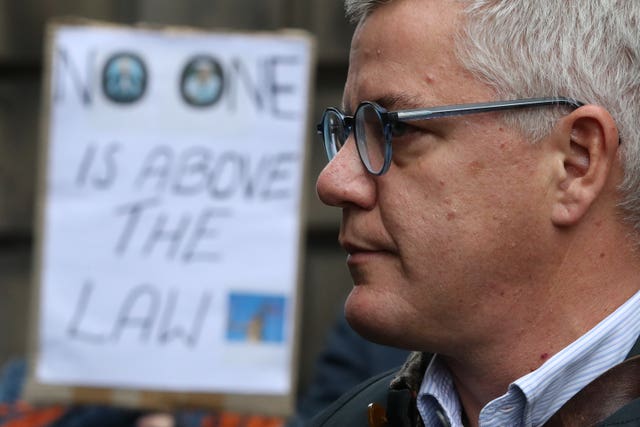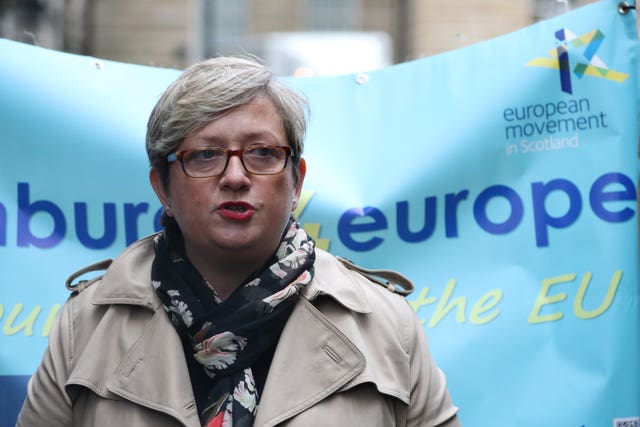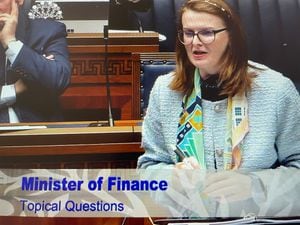PM accepts he must seek Brexit extension if no deal reached, court told
Documents submitted to the Court of Session in Edinburgh on behalf of Boris Johnson were read out on Friday.

The Prime Minister has accepted he must send a letter requesting an Article 50 extension if no deal is agreed with Parliament by October 19, Scotland’s highest civil court has heard.
Documents submitted to the Court of Session on behalf of Boris Johnson were read out on Friday, in which he makes it clear he will not attempt to frustrate the so-called Benn Act.
The legislation, passed by Westminster last month, requires the Prime Minister to ask the EU for a Brexit extension to January 31 if Parliament does not agree to any withdrawal deal Number 10 may come back with by October 19.
Andrew Webster QC, representing the UK Government, said the documents are a “clear statement” as to what the Prime Minister will do.
Legal action launched at the Outer House of the court seeks to create an order which would force Mr Johnson to send the letter and prohibits him from frustrating the Act’s purpose.
This includes banning him from asking EU member states to deny the letter’s request or by sending an additional letter which contradicts it.
Mr Webster said there is no need for an order to be made forcing a letter to be sent, because the court has it on record it will be done.
He said: “What we have is a clear statement on behalf of the Prime Minister and Government as to what it will do in respect to the requirements of the 2019 Act.
“They have been put on record so there can be no doubt.”

He argued a court order would tie the PM’s hands while negotiating, but that Mr Johnson would abide by the Benn Act anyway and not attempt to “frustrate” its intention.
Mr Webster claimed ministers had been “taking a line” which was not inconsistent with the Government’s desire to achieve a result – “we can leave and we will leave on October 31”.
He warned a court order could “ruin” the Government’s negotiation position with the EU, adding: “It would be quite inappropriate for the court to enter the negotiating arena, by saying what can be done.”
Aidan O’Neill QC, representing the campaigners behind the legal action, claimed Mr Johnson’s previous statements go against what he has said to the court through the documents.
He referred to promises made by the Prime Minister that he would rather be “dead in a ditch” than send a letter requesting an extension, and that the UK will leave on October 31 “do or die”.

Mr O’Neill said: “We can’t trust this Government, in light of statements it has made, that it will comply with the law.”
The campaigners’ lawyer also told the court about a “senior Downing Street” source who had been telling the media the Benn Act could be interpreted in a number of ways and that the UK could leave without an extension.
Reading out the quote, Mr O’Neill said: “The Government will comply with the Benn Act, which only imposes a very specific narrow duty concerning Parliament’s letter requesting a delay – drafted by an unknown subset of MPs and pro-EU campaigners – and which can be interpreted in different ways.
“But the Government is not prevented by the Act from doing other things that cause no delay, including other communications, private and public.
“People will have to wait to see how this is reconciled. The Government is making its true position on delay known privately in Europe and this will become public soon.”
The trio behind the court action – businessman Vince Dale, SNP MP Joanna Cherry QC and Jolyon Maugham QC – are seeking an order to ensure Mr Johnson requests an extension if he refuses to abide by the terms of the Benn Act.
Judge Lord Pentland is to announce his decision on Monday.
Meanwhile, a judge at the court’s Inner House has said it would be “unprecedented” for an official to exercise powers to sign an Article 50 extension on behalf of Mr Johnson.

It heard the unique power of nobile officium – which would allow a court official to sign the letter – has never been used over a Prime Minister.
Lord Drummond Young said: “In the circumstances of this case, it is unprecedented. There’s a question of competence.”
The three judges – Lord Drummond Young, Lord Menzies and Lord Turnbull – set the date for the hearing on this aspect of the case for Tuesday.





